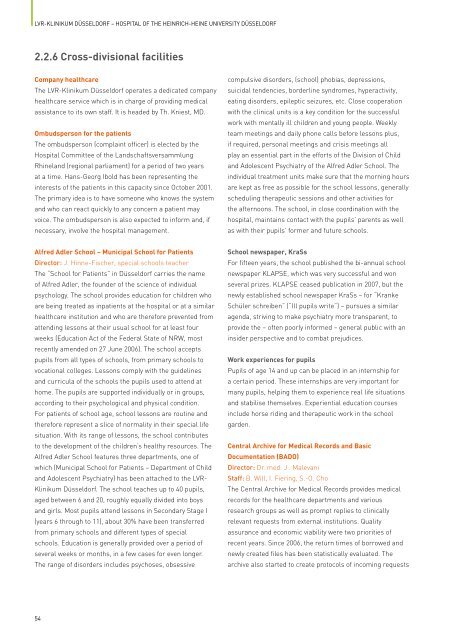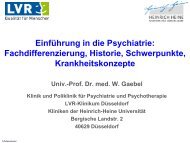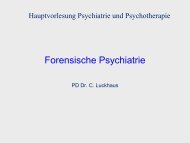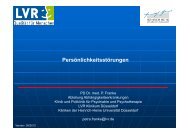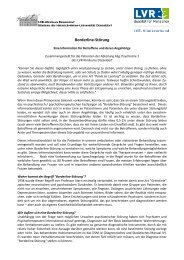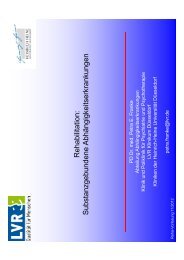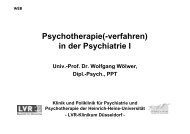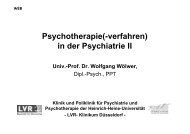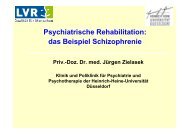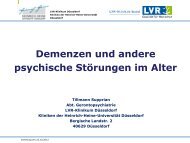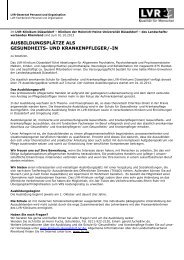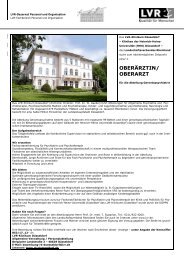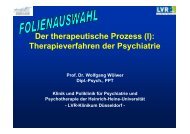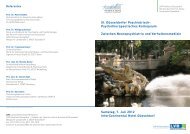LVR-Klinikum Düsseldorf Hospital of the Heinrich-Heine University ...
LVR-Klinikum Düsseldorf Hospital of the Heinrich-Heine University ...
LVR-Klinikum Düsseldorf Hospital of the Heinrich-Heine University ...
Create successful ePaper yourself
Turn your PDF publications into a flip-book with our unique Google optimized e-Paper software.
lVr-KlINIKUM DÜSSelDOrF – HOSPItal OF tHe HeINrIcH-HeINe UNIVerSItY DÜSSelDOrF<br />
2.2.6 Cross-divisional facilities<br />
Company healthcare<br />
The <strong>LVR</strong>-<strong>Klinikum</strong> <strong>Düsseldorf</strong> operates a dedicated company<br />
healthcare service which is in charge <strong>of</strong> providing medical<br />
assistance to its own staff. It is headed by Th. Kniest, MD.<br />
Ombudsperson for <strong>the</strong> patients<br />
The ombudsperson (complaint <strong>of</strong>ficer) is elected by <strong>the</strong><br />
<strong>Hospital</strong> Committee <strong>of</strong> <strong>the</strong> Landschaftsversammlung<br />
Rhineland (regional parliament) for a period <strong>of</strong> two years<br />
at a time. Hans-Georg Ibold has been representing <strong>the</strong><br />
interests <strong>of</strong> <strong>the</strong> patients in this capacity since October 2001.<br />
The primary idea is to have someone who knows <strong>the</strong> system<br />
and who can react quickly to any concern a patient may<br />
voice. The ombudsperson is also expected to inform and, if<br />
necessary, involve <strong>the</strong> hospital management.<br />
Alfred Adler School – Municipal School for Patients<br />
Director: J. Hinne-Fischer, special schools teacher<br />
The “School for Patients” in <strong>Düsseldorf</strong> carries <strong>the</strong> name<br />
<strong>of</strong> Alfred Adler, <strong>the</strong> founder <strong>of</strong> <strong>the</strong> science <strong>of</strong> individual<br />
psychology. The school provides education for children who<br />
are being treated as inpatients at <strong>the</strong> hospital or at a similar<br />
healthcare institution and who are <strong>the</strong>refore prevented from<br />
attending lessons at <strong>the</strong>ir usual school for at least four<br />
weeks (Education Act <strong>of</strong> <strong>the</strong> Federal State <strong>of</strong> NRW, most<br />
recently amended on 27 June 2006). The school accepts<br />
pupils from all types <strong>of</strong> schools, from primary schools to<br />
vocational colleges. Lessons comply with <strong>the</strong> guidelines<br />
and curricula <strong>of</strong> <strong>the</strong> schools <strong>the</strong> pupils used to attend at<br />
home. The pupils are supported individually or in groups,<br />
according to <strong>the</strong>ir psychological and physical condition.<br />
For patients <strong>of</strong> school age, school lessons are routine and<br />
<strong>the</strong>refore represent a slice <strong>of</strong> normality in <strong>the</strong>ir special life<br />
situation. With its range <strong>of</strong> lessons, <strong>the</strong> school contributes<br />
to <strong>the</strong> development <strong>of</strong> <strong>the</strong> children’s healthy resources. The<br />
Alfred Adler School features three departments, one <strong>of</strong><br />
which (Municipal School for Patients – Department <strong>of</strong> Child<br />
and Adolescent Psychiatry) has been attached to <strong>the</strong> <strong>LVR</strong>-<br />
<strong>Klinikum</strong> <strong>Düsseldorf</strong>. The school teaches up to 40 pupils,<br />
aged between 6 and 20, roughly equally divided into boys<br />
and girls. Most pupils attend lessons in Secondary Stage I<br />
(years 6 through to 11), about 30% have been transferred<br />
from primary schools and different types <strong>of</strong> special<br />
schools. Education is generally provided over a period <strong>of</strong><br />
several weeks or months, in a few cases for even longer.<br />
The range <strong>of</strong> disorders includes psychoses, obsessive<br />
54<br />
compulsive disorders, (school) phobias, depressions,<br />
suicidal tendencies, borderline syndromes, hyperactivity,<br />
eating disorders, epileptic seizures, etc. Close cooperation<br />
with <strong>the</strong> clinical units is a key condition for <strong>the</strong> successful<br />
work with mentally ill children and young people. Weekly<br />
team meetings and daily phone calls before lessons plus,<br />
if required, personal meetings and crisis meetings all<br />
play an essential part in <strong>the</strong> efforts <strong>of</strong> <strong>the</strong> Division <strong>of</strong> Child<br />
and Adolescent Psychiatry <strong>of</strong> <strong>the</strong> Alfred Adler School. The<br />
individual treatment units make sure that <strong>the</strong> morning hours<br />
are kept as free as possible for <strong>the</strong> school lessons, generally<br />
scheduling <strong>the</strong>rapeutic sessions and o<strong>the</strong>r activities for<br />
<strong>the</strong> afternoons. The school, in close coordination with <strong>the</strong><br />
hospital, maintains contact with <strong>the</strong> pupils’ parents as well<br />
as with <strong>the</strong>ir pupils’ former and future schools.<br />
School newspaper, KraSs<br />
For fifteen years, <strong>the</strong> school published <strong>the</strong> bi-annual school<br />
newspaper KLAPSE, which was very successful and won<br />
several prizes. KLAPSE ceased publication in 2007, but <strong>the</strong><br />
newly established school newspaper KraSs – for “Kranke<br />
Schüler schreiben” (“Ill pupils write”) – pursues a similar<br />
agenda, striving to make psychiatry more transparent, to<br />
provide <strong>the</strong> – <strong>of</strong>ten poorly informed – general public with an<br />
insider perspective and to combat prejudices.<br />
Work experiences for pupils<br />
Pupils <strong>of</strong> age 14 and up can be placed in an internship for<br />
a certain period. These internships are very important for<br />
many pupils, helping <strong>the</strong>m to experience real life situations<br />
and stabilise <strong>the</strong>mselves. Experiential education courses<br />
include horse riding and <strong>the</strong>rapeutic work in <strong>the</strong> school<br />
garden.<br />
Central Archive for Medical Records and Basic<br />
Documentation (BADO)<br />
Director: Dr. med. J . Malevani<br />
Staff: B. Will, I. Fiering, S.-O. Cho<br />
The Central Archive for Medical Records provides medical<br />
records for <strong>the</strong> healthcare departments and various<br />
research groups as well as prompt replies to clinically<br />
relevant requests from external institutions. Quality<br />
assurance and economic viability were two priorities <strong>of</strong><br />
recent years. Since 2006, <strong>the</strong> return times <strong>of</strong> borrowed and<br />
newly created files has been statistically evaluated. The<br />
archive also started to create protocols <strong>of</strong> incoming requests


